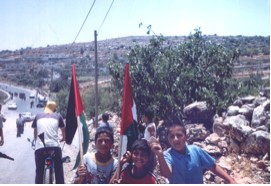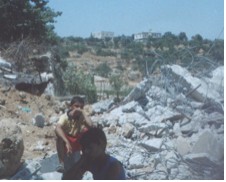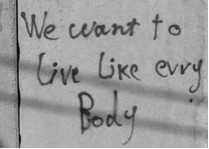End Terrorism: Ask Questions
Emily Churchill | 23.09.2005 11:13 | Social Struggles | Terror War | Birmingham
On Wednesday 27th July I went to Al-Khader, southwest of Bethlehem, where three family homes had just been demolished. I had been taking part in a house-rebuilding project in Anata in East Jerusalem, and that morning we’d received a call telling us about Al-Khader and jumped into taxis as quickly as we could. Unfortunately, the bulldozers had come and gone by the time we got there. I remember, when we arrived, seeing an old woman sitting alone on what remained of her house, crying and hitting her hands together. As we got nearer I saw that a whole family were sitting on the rubble – women and men and lots of young boys, just sitting there in silence. A few of us went over to speak to them and take photos and give sweets to the children – I think we mostly felt pretty awkward and useless. I know I felt utterly at a loss when, in response to my request for a photo, one woman simply spread her hands as if to say “I’m sitting on the ruins of my house, what difference does it make?”

Local boys at Al-Khader

Boys sitting on the rubble of their house in Al-Khader

Graffiti on the Wall at Abu Dis, West Bank
I have come to believe that although much in life may be grey area, demolishing someone’s home is, in most cases, a pretty black and white matter. It is quite simply a terrible thing to do, particularly to someone living in a family-orientated culture where the home is of central importance. If it is to be done, it must be done for good reason, and the victims must be given decent compensation and alternative accommodation. Demolitions of Palestinian homes fail to meet these criteria to an absurd degree, and are often amazingly traumatic experiences for the families involved. Arabia Shawamreh (a Palestinian woman who we stayed with in Anata) didn’t speak for around two months after her house was demolished for the third time. Families are often given very little time to remove all their belongings before their house is demolished – someone I was with in Al-Khader told me he saw a little child trying to find his toys in the rubble. Not only do families not get compensation, but they are also fined in the region of $1500 – and we’re talking about families with a monthly income of around $500. In Jerusalem, families must also pay for the actual demolition of their homes, which would be funny if it wasn’t true. Demolitions are also often violent events, with uncooperative family members being forcibly removed from their homes by soldiers.
As for the justification for house demolitions in Palestine, I can accept none of them. 12,000 houses have been demolished in the occupied territories since 1967. Some of these were demolished for supposed ‘security reasons’ (e.g. demolishing the house of the family of a terrorist), but the vast majority – 95% - had nothing to do with ‘security’. Houses are demolished because the land they sit on has been declared “open green space” or “agricultural land”; to make way for ‘archaeological parks’ (as is the case in Silwan in Jerusalem, where 88 houses are to be demolished); because they are too near settlements or Israeli-only roads or the Wall (although the houses were there first), or because the house was built without a permit. This last reason, like the rest, is no more than nonsense. In Area C of the West Bank, it is practically impossible for an Arab to obtain a building permit, even though she or he actually owns the land. After paying unbelievably hefty sums to even apply for a permit, they will invariably be refused. The reasons given for refusal are, again, almost funny: “the land has a big slope” (as does the land of almost all Israeli settlements), or “you didn’t fill out the form right”, or “the land has been reserved for open green space and so you can’t build on it”. This last excuse was given several times to Anata residents who wanted to build family homes on a hill opposite where we were staying – there is now a huge Israeli interrogation centre there. Salim Shawamreh, Arabia’s husband, is fond of saying “it’s like having bread in your hand and not being allowed to eat it”: the land is yours, but you can’t build on it.
Before my trip to Israel/ Palestine, I didn’t realise the pseudo-administrative nature of so many of the house demolitions there. The Israeli government have created a ridiculous bureaucratic system whereby it is simply impossible for many Palestinians to build houses legally, and so they build illegally for sheer lack of an alternative (again and again I heard “I just had to go ahead and build – where else where my family going to live?”) - and so the demolition of their house is a simple administrative procedure, undertaken not by the army, but by the Civil Administration. And the system is basically and undeniably racist – demolitions just don’t happen to Jewish citizens (with the exception, perhaps, of the Israeli settlers about to be removed from Gaza, who will apparently receive $200,000 to $500,000 in compensation). And while the demolitions continue, 150,000 houses have been built for the Israeli Jews living on the Palestinian side of the Green Line.
So – why have this system, if not for security reasons? I can only think of two reasons. Firstly, criminalizing the building of family homes drives people out of Area C, which can then be used by Israel. Here we have the sad story of “the quiet transfer”: not only do families whose houses are demolished leave the area, but tens of thousands of other families don’t even build on their land for fear of demolition. Thus, there is an artificial housing shortage and people are forced to leave, in a phenomenon I have heard described as “ethnic cleansing in slow motion”. Secondly, I am thinking more and more that much of Israeli policy is simply a result of the view that it just doesn’t matter how you treat Palestinians. Israeli superfear of terrorism means that almost anything can be done in the name of ‘security’, whether or not it actually makes the population any safer. And so the Apartheid Wall is built, a system of ID cards imprisons Palestinians in their own towns, checkpoints make it difficult for them to get anywhere – and what this means is that few Israelis have any real contact with Palestinians, and so are unable to see them as people whose rights must be defended. 'Administrative' house demolitions, highly discriminatory allocation of water and healthcare, and even the prevalence of checkpoints (ii) in the West Bank may not serve any 'anti-terrorist' purpose, but they are met with apathy or support because fear and ignorance of Palestinians is such that they are no longer real human beings, but rather faceless terror-harbourers or terror-supporters, if not actual terrorists. Here lies the cycle: the fear felt by Israelis (which is of course by no means baseless) causes an over-defensive culture that finds expression in aggressive, oppressive policy towards Palestinians. The Palestinians at the receiving end of this policy are driven to a desperation that pushes a small number of them towards terrorist acts, which fuel the fear that is the root of the problem.
Back now to the little boys burning a tyre at Al-Khader. Sometimes I think it’s surprising that there aren’t more Palestinian terrorists. If children grow up seeing homes demolished and having to wait for hours pressed up against the wire at checkpoints as if they’re in a factory farm; if they have to watch the construction of a wall which cuts their family off from their farmland and means they can’t play with the girl next door any more; if they can’t see their Dad because he’s got a Jerusalem ID card and their Mum has a West Bank one and he can’t come and see them because he might get arrested; if their Uncles and Aunts are all out of work because there’s no business since the second intifada, and so on and so on and so on …then they are systematically and consistently being told that they or their people are worthless (or if not worthless then at least Worth Less i.e. less than their Jewish neighbours), and are being driven (by Israeli policy) to feel a dangerous combination of anger and helplessness, and to want to resist. And if no avenue is given for resistance – if there is no space for Palestinians to work for a genuine change in their situation – then some will turn to terrorism.
What I’m trying to say is, contrary to what Tony Blair might have us believe, we do not have to choose between a policy of anti-terrorism and one of respect for human rights. Quite the opposite: we must respect human rights in order to stop terrorism. It is perhaps a natural reaction to the horror of terrorism to wage terrified war: to drop bombs on those who might be ‘harbouring terrorists’; to build eight-metre high concrete walls to try to keep the enemy out; to sacrifice the right to a fair trial - or even a trial at all - in the name of ‘security’. Perhaps we could build high enough walls and kill enough people and put enough restrictions on everyone’s freedom to stop terrorist attacks, but having been to Israel, I really don’t think this is a good road to head down. What’s more, I’m not even certain it would work. My view is that we must respond to the emergency in which we find ourselves by being extraordinarily brave, dropping all the talk of The Enemy, Them, Us and Evil (“just a four letter word that means nothing at all”(iii)) and daring to ask and address the Big Questions. Such as “if all terrorists are nothing but religious fanatics, then why are terrorist attacks more common these days?” and “what makes someone turn to religious extremism?” and “why are there more terrorists in certain parts of the world than others?” and “do all terrorists have an alternative way of being heard?”. Not only would this response be a profoundly more humane one than snatching away people’s human rights in the name of ‘security’, but it would also be enormously more effective. Terrorism works by making people afraid – just look at the word. To refuse to be ‘terrified’ and to work to understand terrorism would render it powerless. I realise that asking “why?” would be a pretty much unprecedented event in the history of the ‘War on Terror’, but as everyone seems to be saying at the moment, we live in “extraordinary times which call for the introduction of extraordinary measures”.(iv)
(i) Marie Curie
(ii) Someone pointed out to me that checkpoints don’t actually serve a security purpose, because all the soldiers do at checkpoints is check your ID card, and there’s no reason at all why you couldn’t have both an ID card and a bomb in your bag. What checkpoints do do is make journeys that should take one hour take five.
(iii) Misty’s Big Adventure – Evil
(iv) Ken Jones, Association of Chief Police Officers
Emily Churchill went to Palestine with the Israeli Committee Against House Demolitions
 http://www.icahd.org
http://www.icahd.org  http://www.thewallmustfall.org
http://www.thewallmustfall.org  http://www.arna.info
http://www.arna.info  http://www.savesilwan.org
http://www.savesilwan.org
Emily Churchill